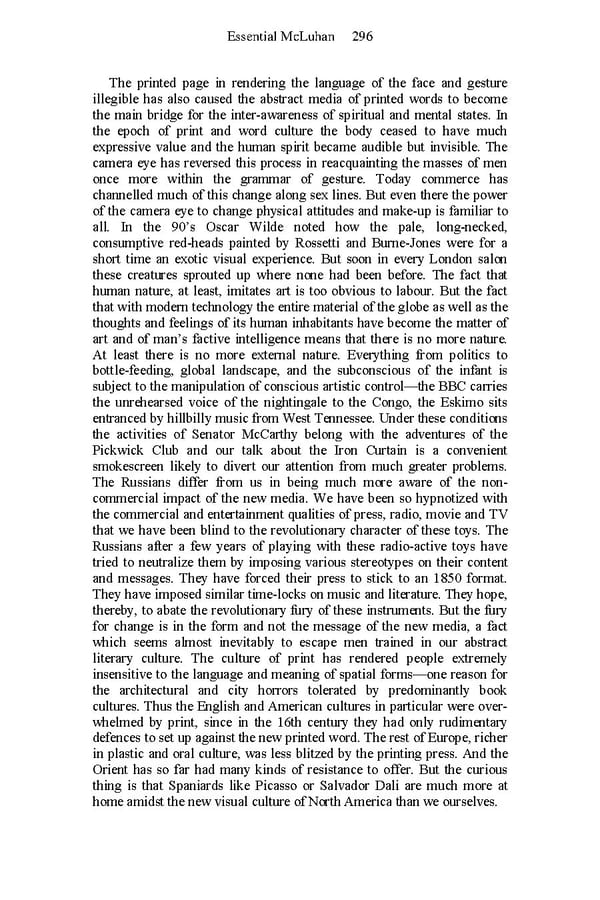Essential McLuhan 296 The printed page in rendering the language of the face and gesture illegible has also caused the abstract media of printed words to become the main bridge for the inter-awareness of spiritual and mental states. In the epoch of print and word culture the body ceased to have much expressive value and the human spirit became audible but invisible. The camera eye has reversed this process in reacquainting the masses of men once more within the grammar of gesture. Today commerce has channelled much of this change along sex lines. But even there the power of the camera eye to change physical attitudes and make-up is familiar to all. In the 90’s Oscar Wilde noted how the pale, long-necked, consumptive red-heads painted by Rossetti and Burne-Jones were for a short time an exotic visual experience. But soon in every London salon these creatures sprouted up where none had been before. The fact that human nature, at least, imitates art is too obvious to labour. But the fact that with modern technology the entire material of the globe as well as the thoughts and feelings of its human inhabitants have become the matter of art and of man’s factive intelligence means that there is no more nature. At least there is no more external nature. Everything from politics to bottle-feeding, global landscape, and the subconscious of the infant is subject to the manipulation of conscious artistic control—the BBC carries the unrehearsed voice of the nightingale to the Congo, the Eskimo sits entranced by hillbilly music from West Tennessee. Under these conditions the activities of Senator McCarthy belong with the adventures of the Pickwick Club and our talk about the Iron Curtain is a convenient smokescreen likely to divert our attention from much greater problems. The Russians differ from us in being much more aware of the non- commercial impact of the new media. We have been so hypnotized with the commercial and entertainment qualities of press, radio, movie and TV that we have been blind to the revolutionary character of these toys. The Russians after a few years of playing with these radio-active toys have tried to neutralize them by imposing various stereotypes on their content and messages. They have forced their press to stick to an 1850 format. They have imposed similar time-locks on music and literature. They hope, thereby, to abate the revolutionary fury of these instruments. But the fury for change is in the form and not the message of the new media, a fact which seems almost inevitably to escape men trained in our abstract literary culture. The culture of print has rendered people extremely insensitive to the language and meaning of spatial forms—one reason for the architectural and city horrors tolerated by predominantly book cultures. Thus the English and American cultures in particular were over- whelmed by print, since in the 16th century they had only rudimentary defences to set up against the new printed word. The rest of Europe, richer in plastic and oral culture, was less blitzed by the printing press. And the Orient has so far had many kinds of resistance to offer. But the curious thing is that Spaniards like Picasso or Salvador Dali are much more at home amidst the new visual culture of North America than we ourselves.
 Essential McLuhan Page 302 Page 304
Essential McLuhan Page 302 Page 304